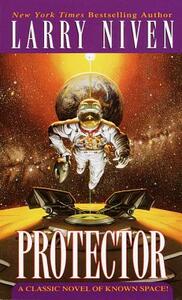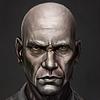Take a photo of a barcode or cover
This book is full of interesting ideas, and features a fascinating space battle taking place across years of time and light years of distance. I really enjoyed it.
adventurous
dark
mysterious
tense
fast-paced
Plot or Character Driven:
Plot
Strong character development:
Complicated
Loveable characters:
Yes
Diverse cast of characters:
No
Flaws of characters a main focus:
No
There are a lot of cool concepts here regarding human origins, aliens, cool gravity-bending worlds to explore. Honestly the story lost me a few times and the ending felt a bit sudden, but there were some really engaging parts. This is my first of Niven’s “Known Space” universe and I’m definitely inspired to pick up more as I see them.
medium-paced
This is one of Niven's early novels and some of the issues raised by other reviewers reflect that but I keep coming back to it every year or so. By far, this rates highly among my favorites of all his books.
Niven uses a lot of hard science concepts along with some really imaginative aliens and evolutionary ideas. One of the cool features is a time dialated space battle that seems more realistic than most space battles in books or movies (also more boring).
About halfway through I realized that this was two novellas just jammed together, which felt a bit disjointed.
Lots of cool ideas and very flat characters- pretty much what you’d expect from Larry Niven but it’s not his best.
*bonus points for the ballsy ending.
About halfway through I realized that this was two novellas just jammed together, which felt a bit disjointed.
Lots of cool ideas and very flat characters- pretty much what you’d expect from Larry Niven but it’s not his best.
*bonus points for the ballsy ending.
Another for my Hindsight 2020 re-reads.
It’s a touch more sexist than I recall, but not too bad considering it was written in 1972. The women are just as smart and capable as the men, with a couple in positions of authority. Still, there is a touch of “I’m just a girl!” to some of it.
As with all SF from this era the tech is sometimes painfully outdated, with the exception that people have phones on them the way we do today. Also the throwaway bit about how shoes are individually tailored to each person by machine.
Other than that it’s a cool adventure, as Phssthpok the Pak comes blasting into the solar system from the galactic center, bearing the gift of knowledge and power in the form of a vegetable-born virus that turns hominids into sexless superintelligent protectors.
In terms of biology and evolution it makes no sense at all, of course. Hominids evolved here on Earth, not thousands of light years away. In the larger context of the Known Space universe, Earth and similar worlds were food-producing planets for the alien slavers known as the Thrint billions of years ago, which is why we’re all basically compatible. So we can kinda-sorta handwave away the similarities between Pak (aka homo habilis) and prehistoric primates on Earth by invoking parallel evolution from a common starting point. Pak and humans also vaguely resemble the Thrint’s most advanced slave species, the Tnuctipin, but none of that is contained in this book aside from mentions and hints.
I did the audiobook this time because I was curious about pronunciations that I’ve always assumed for the past 40 years. Turns out Phssthpok and the like are pronounced exactly as I thought. It’s weird that I didn’t need to look up how to spell his name (or the Tnuctipin) after all this time. The narrator, Tom Weiner, does an excellent job, and I find it interesting that his Belter accent is a variation of British, Australian and South African, depending on the character, which is similar to the Belter accents in The Expanse. I wonder if they’ve influenced each other?
The core of this book is one of those cool ideas that combines stories we’ve always told, such as the Tree of Life and Tree of Knowledge from the Bible, with extrapolation of certain biological things which we all experience. Recontextualizing aging as the stages we need to go through to turn into super smart, super strong, super athletic guardians of breeders is a stroke of literary genius, and that’s the sort of thing I read sci-fi for. Enlarged joints aren’t just due to arthritis but are intended to give the protector stage greater range of motion. Losing our teeth is to make way for the more durable fused bony beak, and so on. We just lack the virus contained in the Tree of Life root in order to complete the change.
I also like the idea that superintelligence limits your choices. There’s always only one right answer to almost any problem. That sets up a lot of conflict when trying to battle a Pak protector, made even worse when trying to fight an even smarter human protector. They’re always ten steps ahead of you and are physically more durable and dangerous, but they don’t want to hurt you if you belong to the same species because they *have* to protect you. It’s a viral compulsion.
It’s a touch more sexist than I recall, but not too bad considering it was written in 1972. The women are just as smart and capable as the men, with a couple in positions of authority. Still, there is a touch of “I’m just a girl!” to some of it.
As with all SF from this era the tech is sometimes painfully outdated, with the exception that people have phones on them the way we do today. Also the throwaway bit about how shoes are individually tailored to each person by machine.
Other than that it’s a cool adventure, as Phssthpok the Pak comes blasting into the solar system from the galactic center, bearing the gift of knowledge and power in the form of a vegetable-born virus that turns hominids into sexless superintelligent protectors.
In terms of biology and evolution it makes no sense at all, of course. Hominids evolved here on Earth, not thousands of light years away. In the larger context of the Known Space universe, Earth and similar worlds were food-producing planets for the alien slavers known as the Thrint billions of years ago, which is why we’re all basically compatible. So we can kinda-sorta handwave away the similarities between Pak (aka homo habilis) and prehistoric primates on Earth by invoking parallel evolution from a common starting point. Pak and humans also vaguely resemble the Thrint’s most advanced slave species, the Tnuctipin, but none of that is contained in this book aside from mentions and hints.
I did the audiobook this time because I was curious about pronunciations that I’ve always assumed for the past 40 years. Turns out Phssthpok and the like are pronounced exactly as I thought. It’s weird that I didn’t need to look up how to spell his name (or the Tnuctipin) after all this time. The narrator, Tom Weiner, does an excellent job, and I find it interesting that his Belter accent is a variation of British, Australian and South African, depending on the character, which is similar to the Belter accents in The Expanse. I wonder if they’ve influenced each other?
The core of this book is one of those cool ideas that combines stories we’ve always told, such as the Tree of Life and Tree of Knowledge from the Bible, with extrapolation of certain biological things which we all experience. Recontextualizing aging as the stages we need to go through to turn into super smart, super strong, super athletic guardians of breeders is a stroke of literary genius, and that’s the sort of thing I read sci-fi for. Enlarged joints aren’t just due to arthritis but are intended to give the protector stage greater range of motion. Losing our teeth is to make way for the more durable fused bony beak, and so on. We just lack the virus contained in the Tree of Life root in order to complete the change.
I also like the idea that superintelligence limits your choices. There’s always only one right answer to almost any problem. That sets up a lot of conflict when trying to battle a Pak protector, made even worse when trying to fight an even smarter human protector. They’re always ten steps ahead of you and are physically more durable and dangerous, but they don’t want to hurt you if you belong to the same species because they *have* to protect you. It’s a viral compulsion.
Compelling in some respects, but a little too obviously a fix-up novel of two separate novellas, the latter of which relies too much on major coincidences and heavy-handed plot devices in order to nudge the protagonists together. Full review: https://fakegeekboy.wordpress.com/2021/12/14/a-chronological-exploration-of-known-space-part-1-20th-24th-centuries/
adventurous
challenging
dark
funny
mysterious
tense
fast-paced
Plot or Character Driven:
Plot
Strong character development:
Yes
Loveable characters:
Complicated
Diverse cast of characters:
Yes
This book is one which I first read many years ago, and is something of a favourite of mine. One of Larry Niven's "Known Space" series, it takes as its starting point the idea that the changes to the human body are not the organism wearing out and shutting down, but rather the beginning of a transition to the next stage of adulthood, the super strong, fast, intelligent, sexless Protector which guards all of its child and breeder descendants. On Earth this transition no longer applies, but this book tells of what happens when a Protector from the actual home world of the human race (which is not Earth) comes along.
Like most of Niven's books the central ideas are worked out carefully and consistently, making for a very entertaining read for any fan of hard SF.
Like most of Niven's books the central ideas are worked out carefully and consistently, making for a very entertaining read for any fan of hard SF.





